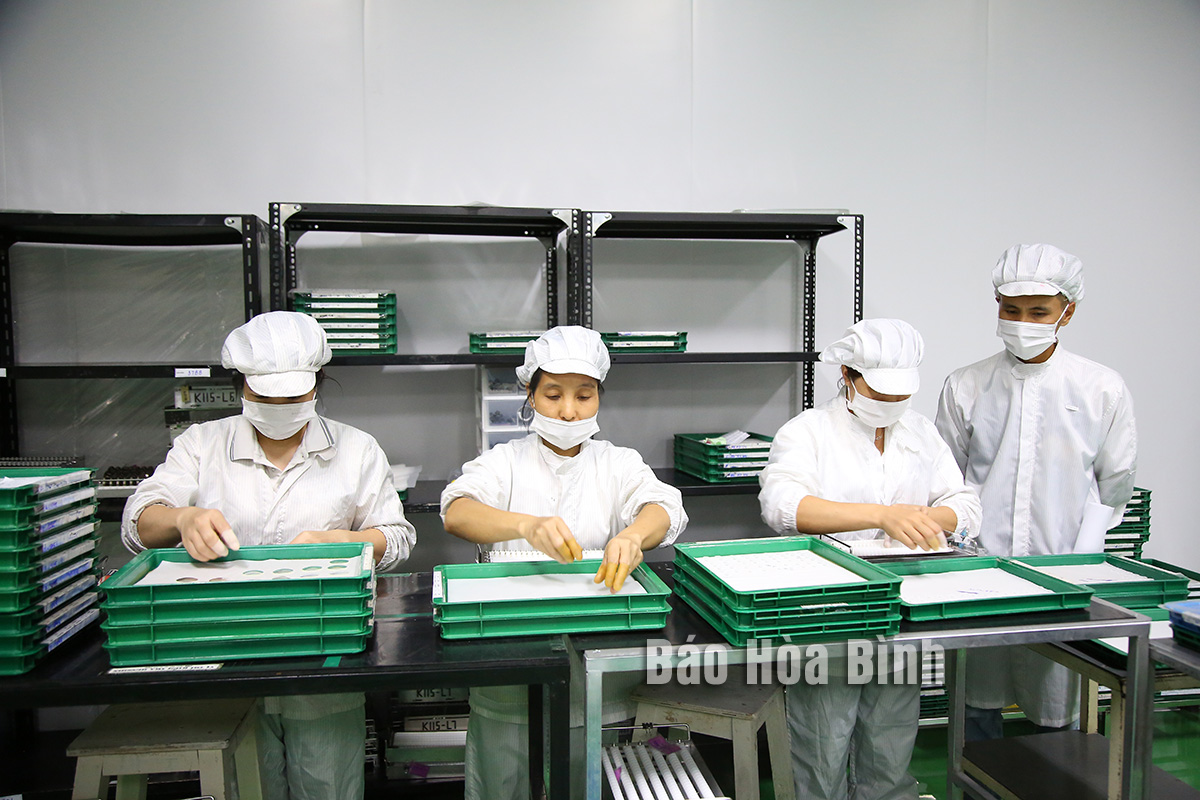



R Technical Research Vietnam Co. Ltd., locating in the Da River Left Bank Industrial Park in Hoa Binh city, focuses on training highly-skilled young workers.
Last year, Hoa Binh province had 4,482 non-State enterprises which contributed nearly 70% to its total state budget revenue and provided stable jobs for over 83,000 labourers, statistics showed. The average income of workers reached 5.7 million VND per person per month. Nearly 2,100 new jobs were created last year.
In recent years, trade unions at all levels have leveraged their role within enterprises to improve the material and spiritual lives for their members, ensuring a conducive working environment and boosting production and business activities. However, amidst economic challenges and global economic downturns, many enterprises have struggled to survive, affecting the lives of their workers.
As a mountainous province and a gateway to the northwestern region, Hoa Binh faces a lot of economic difficulties. Micro-, small-, and medium-sized enterprises account for 95% of the total number of businesses in the locality. Investment resources allocated to essential infrastructure in industrial zones (IZs) have been limited. Housing facilities for workers in these IZs have not been adequately planned, thus, most workers coming from afar have to rent affordable housing. They also face difficulties in registering their children for school due to housing instability. Some workers are forced to quit their jobs to care for their children or send them back to their hometowns to save living costs.
One of the current concerns for labourers is the inadequate health care provided by employers. At dialogues between employers and workers, the majority of workers asked employers to improve working conditions to ensure their health, enhance the quality of meals, and maintain initial health care activities.
According to Le Dieu Hoan, vice chairman of the trade union of the IZs, due to the impact of the global economy, many enterprises in industrial zones have suffered a decrease in orders, forcing workers to be off work in turn and having their income reduced. This has resulted in inefficient operations of grassroots trade unions within enterprises.
By the end of 2023, 72 enterprises in the province had established Party organisations, accounting for 1.6%; 234 enterprises had trade unions, making up 5.2%, and 28 enterprises had youth unions, accounting for 0.6%. The number of party organisations and workers' associations in non-state enterprises remains modest and is not on par with the number of enterprises.
Due to a lack of consensus between Party committees and employees and ineffective operation of youth unions, the roles of Party organisations and associations within enterprises haven’t been fully tapped, resulting in unsecured legitimate rights and interests of workers.
Nguyen Manh Cuong, President of the provincial Federation of Labour, said that the scale of the working class in the province in recent years has seen significant development in terms of quantity and quality, making substantial contributions to local economic and social development.
To build a workforce capable of meeting tasks in the new situation, the federation will step up the dissemination of the Party's guidelines, and the State's policies and laws, along with resolutions of trade unions, he noted.
It will continue to direct trade unions at the grassroots level to focus on protecting the legitimate rights and interests of workers, thereby improving their quality of life.
Attention should be paid to training and fostering high-quality human resources, Cuong said, adding that it is necessary to grab the aspirations of the workforce which will serve as the basis for defining operational goals, contributing to the development of a stronger contingent of workers to meet the development requirements in the new context.